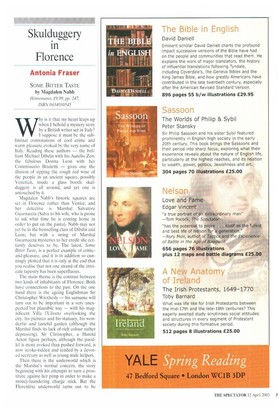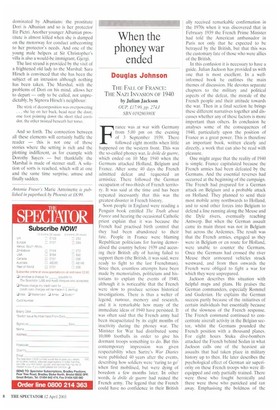Skulduggery in Florence
Antonia Fraser
SOME BITTER TASTE by Magdalen Nabb Heinen2ann, £9.99, pp. 247, ISBN 0434010545 Why is it that my heart leaps up when I behold a mystery story by a British writer set in Italy? I suppose it must be the subliminal connotations of cool crime and warm pleasure evoked by the very name of Italy. Reading these authors the brilliant Michael Dibdin with his Aurelio Zen, the fabulous Donna Leon with her Commissario Brunetti — gives one the illusion of sipping the rough red wine of the people in an ancient square, possibly Venetian, inside a glass booth: skulduggery is all around, and yet one is untouched by it.
Magdalen Nabb's historic squares are set in Florence rather than Venice, and her detective is Marshal Salvatore Guarnaccia (Salva to his wife, who is prone to ask what time he is coming home in order to put on the pasta). Nabb may not yet be in the bestselling class of Dibdin and Leon, but with a string of Marshal Guarnaccia mysteries to her credit she certainly deserves to be. The latest, Some Bitter Taste, is a perfect example of crimeand-pleasure, and it is in addition so cunningly plotted that it is only at the end that you realise that not one strand of the intricate tapestry has been superfluous.
The main theme is the contrast between two kinds of inhabitants of Florence. Both have connections to the past. On the one hand there is the ageing Englishman Sir Christopher Vv'rothesly — his surname will turn out to be important in a very unex
pected but plausible way with his magnificent Villa l'Uliveto overlooking the city, his pictures and his statuary, his wonderful and tasteful garden (although the Marshal finds its lack of rich colour rather depressing). Sir Christopher, a Harold Acton figure perhaps, although the parallel is more evoked than pushed forward, is now stroke-ridden and tended by a devoted secretary as well as young male helpers.
Then there is the underworld which is the Marshal's normal concern, the story beginning with his attempts to turn a prostitute against her pimp in order to make a money-laundering charge stick. But the Florentine underworld turns out to be dominated by Albanians: the prostitute Dori is Albanian and so is her protector Ilir Pictri. Another younger Albanian prostitute is almost killed when she is dumped on the motorway for conduct unbecoming to her protector's needs. And one of the young male helpers at Sir Christopher's villa is also a would-be immigrant, Gjergi.
The last strand is provided by the visit of a frightened old lady to the Marshal: Sara Hirsch is convinced that she has been the subject of an intrusion although nothing has been taken. The Marshal, with the problems of Dori on his mind, allows her to depart — only to be called, not unpredictably, by Signora Hirsch's neighbour:
The stink of decomposition was overpowering • . she lay on her back, head near the door, one foot pointing down the short tiled corridor, the other twisted beneath her torso.
And so forth. The connection between all these elements will certainly baffle the reader — this is not one of those stories where the setting is rich and the plotting indifferent, as for example with Dorothy Sayers — hut thankfully the Marshal is made of sterner stuff. A solution of sorts is reached, which will at one and the same time surprise, amuse and finally sadden.
Antonia Fraser's Marie Antoinette is published in paperback by Phoenix at 18.99.



































































 Previous page
Previous page